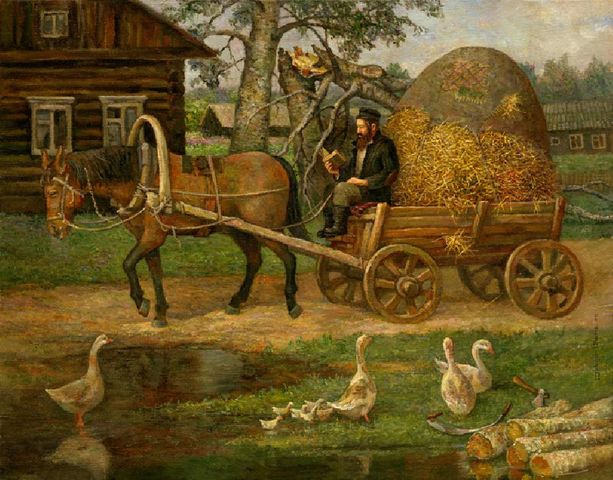This week’s Taste of Torah is written by Micah Hyman, a sophomore at Yeshiva University, studying computer science. Hyman spent two years at Yeshivat Sha’alvim in Nof Ayalon, Israel, studying Torah.
One morning, as Rav Levi Yitzchak of Berdetchiv was walking, he passed a wagon. A man then crawled out from underneath it, holding a wrench and a couple of screws. Muddy from the ground soil and greasy from working on the wheel axles, the man looked like a train wreck. He tossed away his wrench, and reached into a nearby barrel — perhaps to get a bite to eat, Rav Levi Yitzchak surmised. Instead, much to his surprise, the man extracted a pair of tefillin and began laying them — paying no heed to the mud and grease! Another Jew passed by and remarked with a deep sigh to Rav Levi Yitzchak, “It’s really something…”
“I know,” Rav Levi Yitzchak responded, “to think that even when he’s this dirty this wagon driver loves Tefillin enough to put them on!”
Rav Levi Yitzchak was following a commandment in this week’s Torah portion, Kedoshim, that states: “B’Tzedek Tishpos Amisecha” — to judge the nation righteously. Although ostensibly an obligation for Dayanim (judges), Chazal (as explained by Rashi) interprets this command as a perennial message to all people to “Dan Es Chaveiro L’Kaf Zechus” — judge your friend favorably.
The natural reaction to the story is to smile at the naivete — even foolishness — of Rav Levi Yitzchak. Every reasonable person can tell that, most likely, this wagon driver did not particularly care about his Tefillin and was mucking them up for that reason.
Even so, I would like to demonstrate the applicabile lesson to our lives of Rav Levi Yitzchak’s aforementioned reaction. Of course, we must be wary and scrutinable of others, to assure we won’t be cheated or mistreated, since we cannot trust that everyone is motivated by an unalloyed altruism of people we usually directly interact with. However, for the random passerby on the street, who we will never interact with again, we can only benefit by giving that stranger the benefit of doubt. (So, some random person just threw litter into the grass. Maybe he’s leaving it there temporarily. What harm is there to think positive of such a person and his actions?) Having this inherent positive disposition to others will help us become more positive and loving people, who see only the best in others. And even more so, this positive, optimistic and light-hearted disposition to others can only help us form stronger relationships with those whom we are already closest to.
—
This article is part of Ha’Am’s Friday Taste of Torah column. Each week, a different UCLA community member will contribute some words of Jewish wisdom in preparation for Shabbat.

